

An integral part of New York City’s municipal hospital system, NYC Health + Hospitals/Metropolitan is a highly respected facility that provides primary and comprehensive health care to all patients, from a wide spectrum of ethnic and socioeconomic backgrounds. As a result, our trainees from the New York Medical College Internal Medicine Residency at NYC Health + Hospitals/Metropolitan encounter the widest possible spectrum of medical problems, from commonplace to the most obscure and perplexing. Also, because our patients come from socially and culturally diverse backgrounds, our trainees gain valuable insights regarding the human side of medicine.
The Department of Medicine at Metropolitan has a long tradition of training competent internists who have pursued successful and prestigious careers. We are not, however, resting on our laurels. The program is constantly improving and innovating house-staff training to enable us to keep pace with the changing times and thoroughly prepare our trainees for virtually any career path.
In summary, we believe that we have developed a program that offers challenging and exciting opportunities, and a quality educational experience for our trainees. We hope that you will agree with us and consider becoming a member of our professional family.
 Meet the Team
Meet the TeamShobhana Chaudhari, M.D., FACP, AGSF
Program Director, Chief of Geriatrics
Juan Cosico, M.D.
Associate Program Director, Hospitalist, Internal Medicine
 Dr. Cosico received his medical degree from University of the East Medical Center in the Philippines, and is a graduate of the New York Medical College Metropolitan Internal Medicine Residency Program. Following a Chief Medical Resident year, he continued his dedication to serving the community of NYC Health + Hospitals/Metropolitan as a hospitalist/attending physician, with a focus on maintaining a supportive training environment and fostering competent, compassionate care to patients.
Dr. Cosico received his medical degree from University of the East Medical Center in the Philippines, and is a graduate of the New York Medical College Metropolitan Internal Medicine Residency Program. Following a Chief Medical Resident year, he continued his dedication to serving the community of NYC Health + Hospitals/Metropolitan as a hospitalist/attending physician, with a focus on maintaining a supportive training environment and fostering competent, compassionate care to patients.
View Chief Medical Residents in the Program
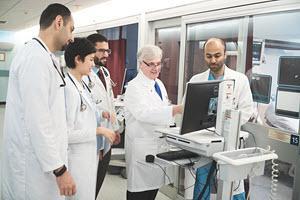 The fundamental goals and objectives of our program are to train competent, qualified, caring, and sensitive physicians who are mindful of the significance of their role in the diagnosis and treatment of diseases, alleviation of suffering, and prevention of illness. They should be able to provide empathetic support to those afflicted with medical illness and should be ready to practice medicine independently by the end of their training. Our core curriculum and teaching program are structured to attain these objectives and to achieve all 6 ACGME core competencies through the different rotations during training. The combination of clinical and didactic training offered through the Internal Medicine Residency Program provides a more complete educational base and will guide you in your professional endeavors.
The fundamental goals and objectives of our program are to train competent, qualified, caring, and sensitive physicians who are mindful of the significance of their role in the diagnosis and treatment of diseases, alleviation of suffering, and prevention of illness. They should be able to provide empathetic support to those afflicted with medical illness and should be ready to practice medicine independently by the end of their training. Our core curriculum and teaching program are structured to attain these objectives and to achieve all 6 ACGME core competencies through the different rotations during training. The combination of clinical and didactic training offered through the Internal Medicine Residency Program provides a more complete educational base and will guide you in your professional endeavors.
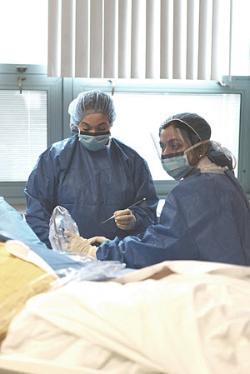 It is our objective to train physicians to understand the principles of Internal Medicine and be able to function effectively in whichever area of medicine they choose to practice. Our trainees are exposed to a variety of settings including, in-patient wards, primary care continuity clinic, and subspecialty rotations. In the primary care clinic, residents have their own patient panel whom they see while being supervised by an attending physician. In the inpatient rotation, there are six teams in three different units. Each team consists of students, interns, residents, and an attending physician. Such clinical exposures enable our trainees to manage patients with basic as well as complex medical issues, comprehensively. The training also provides sufficient opportunities for our trainees to enhance their clinical experience and become competent well-rounded physicians.
It is our objective to train physicians to understand the principles of Internal Medicine and be able to function effectively in whichever area of medicine they choose to practice. Our trainees are exposed to a variety of settings including, in-patient wards, primary care continuity clinic, and subspecialty rotations. In the primary care clinic, residents have their own patient panel whom they see while being supervised by an attending physician. In the inpatient rotation, there are six teams in three different units. Each team consists of students, interns, residents, and an attending physician. Such clinical exposures enable our trainees to manage patients with basic as well as complex medical issues, comprehensively. The training also provides sufficient opportunities for our trainees to enhance their clinical experience and become competent well-rounded physicians.
Our program has numerous didactic lectures which include the following: daily morning reports, daily noon conferences, weekly ground rounds, monthly journal club, weekly morbidity and mortality conferences, bi-monthly discussion of challenging medical cases, and monthly clinical question conferences. Third-year residents also participate in the monthly hospital-wide root cause analysis. First-year residents have weekly PGY1 conferences. A year-long board review course is offered to all residents through combined video conferences and lectures by the faculty.
Our program offers a robust clinical experience in Internal Medicine and its subspecialties in both the inpatient and outpatient settings. Our trainees actively participate in clinical decision making of all the patients they see. Scholarly publications and presentations in national, regional and local academic meetings are encouraged. All residents are required to have at least one scholarly activity to be presented prior to the end of training. Our Chief of Medicine is the head of the hospital’s research committee and our Program Director is an integral member of the Annual Resident’s Research Day.
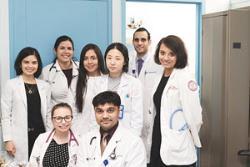 All faculty members are excited to help trainees achieve their professional goals and are mentors to the residents. Residents have direct access to all faculty members including the program leadership and the Chief of Medicine. The Chief Medical Residents are always available to the residents and play a vital role in the open communication between the residents, faculty members, and the program leadership.
All faculty members are excited to help trainees achieve their professional goals and are mentors to the residents. Residents have direct access to all faculty members including the program leadership and the Chief of Medicine. The Chief Medical Residents are always available to the residents and play a vital role in the open communication between the residents, faculty members, and the program leadership.
The simulation curriculum encompasses various training tools in order to increase confidence and proficiency in procedures such as paracentesis, intra-articular injections, lumbar punctures, running code blue/ACLS, and RRT training/mock codes.
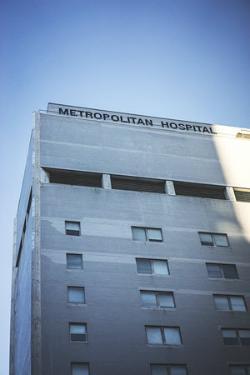 New York Medical College Affiliation
New York Medical College Affiliation“While we teach, we learn,” said the Roman philosopher Seneca. The affiliation with NYMC provides our house-staff with the crucial role of delivering medical education to students at different levels of training, ultimately encouraging trainees to work harder to understand the material, recall it more accurately, and apply it more effectively in clinical practice.
Located at the border of East Harlem and Manhattan’s Upper East Side, trainees have the opportunity to treat patients from different ethnic, social, and economic backgrounds, broadening their experience and training. The location also offers unlimited opportunities to unwind and explore New York City.
Trainees are on a 4+1 block schedule.
What does 4+1 mean? In traditional Internal Medicine residency schedules, house officers leave their rotations one afternoon per week to see outpatients in continuity clinic. While this structure has provided adequate ambulatory training and allows residents to develop a panel of patients for whom they are the primary physician, it creates a tension between in- and outpatient training and pulls residents in two directions at once – which is not ideal for your education or for patient care.
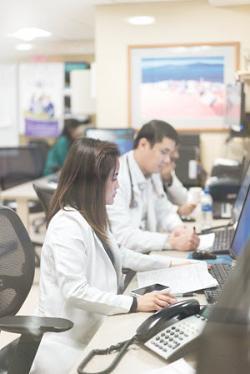 A “4+1” block schedule means that our house officers have a four-week rotation block (that you won’t leave for continuity clinic), followed by one week of exclusively ambulatory training. This pattern is repeated back-to-back 10 times throughout the entire year. The ambulatory week includes a combination of continuity clinic sessions and subspecialty clinic within the ambulatory rotation. House officers will continue to have a longitudinal relationship with their clinic patients and preceptors throughout residency.
A “4+1” block schedule means that our house officers have a four-week rotation block (that you won’t leave for continuity clinic), followed by one week of exclusively ambulatory training. This pattern is repeated back-to-back 10 times throughout the entire year. The ambulatory week includes a combination of continuity clinic sessions and subspecialty clinic within the ambulatory rotation. House officers will continue to have a longitudinal relationship with their clinic patients and preceptors throughout residency.
The “4+1” schedule improves your educational experience, improves patient care, improves continuity with your clinic patients. Note this does not change inpatient rotations, which continue to abide by all duty hours requirements, including the one-day-off-in-seven rule.
Another benefit of the “4+1” schedule is that you won’t be rushing to get to afternoon clinic. This means that your inpatient team won't be leaving and signing out to each other, leaving someone to cross cover all afternoon.
Preliminary interns do not have a continuity clinic, however, in response to prior feedback, our preliminary interns will also have ambulatory experience in the medicine and subspecialty clinics.
Post-Graduate Year 1 (Categorical) Rotations*
|
Medical Service (Wards) |
24 weeks |
|
Ambulatory Care Block |
10 - 11 weeks |
|
Medical Intensive Care (MICU) |
4 weeks |
|
Coronary Care Unit (CCU)/Cardiology |
4 weeks |
|
Night Float |
4 weeks |
|
Emergency Department |
4 weeks |
|
Vacation |
4 weeks |
Post-Graduate Year 1 (Preliminary) Rotations*
|
Medical Service (Wards) |
20 weeks |
|
Medical Intensive Care (MICU) |
8 weeks |
|
Night Float |
6 weeks |
|
Emergency Department |
4 weeks |
|
Cardiology |
2 weeks |
|
Neurology |
4 weeks |
|
Vacation |
4 weeks |
Post-Graduate Year 1 Designated Ophthalmology (Preliminary) Rotations*
|
Medical Service (Wards) |
16 weeks |
|
Ophthalmology |
12 weeks |
|
Medical Intensive Care (MICU) |
4 weeks |
|
Night Float |
4 weeks |
|
Emergency Department |
4 weeks |
|
Neurology |
4 weeks |
|
Vacation |
3 weeks during medicine rotation and 1 week during ophthalmology rotation |
Post-Graduate Year 2 Rotations*
|
Medical Service (Wards) |
16 weeks |
|
Ambulatory Care Block |
10 - 11 weeks |
|
Medical Intensive Care (MICU) |
4 weeks |
|
Night Float |
6 weeks |
|
Subspecialty Rotations |
4 weeks |
|
Neurology |
4 weeks |
|
Cardiology |
4 weeks |
|
Ambulatory Care Block |
6 weeks |
|
Vacation |
4 weeks |
Post-Graduate Year 3 Rotations*
|
Medical Intensive Care (MICU) |
4 weeks |
|
Ambulatory Care Block |
10 - 11 weeks |
|
Coronary Care Unit (CCU) |
2 - 4 weeks |
|
Medical Consultation Service |
4 weeks |
|
Medical Intensive Care (MICU) Night |
4 – 7 weeks |
|
Subspecialty Rotations |
16 weeks |
|
Geriatrics |
4 weeks |
|
Cardiac Catheterization (Bellevue Hospital) |
1 week |
|
Vacation |
4 weeks |
*Please note, although these are the typical rotations for our residents, schedules and rotation structure are subject to change.
The Committee of Interns and Residents (CIR) is a labor union that represents residents in training at various institutions across the country. Through the CIR agreement, residents at Metropolitan receive many benefits including a stipend for educational resources (i.e. books, test fees, portable devices), CME, dental insurance, vision insurance, death and disability insurance, among others.
Our residents and faculty have unlimited opportunities to experience New York City regardless of their interests. Resident wellness is supported by regular group gatherings in and outside the hospital. We take resident wellness very seriously and continue to improve the program while utilizing CIR benefits and our hospital wellness committee.
New York City is arguably the greatest city in the world. Take the time to explore the endless sights and sounds. Whether your interests are music, food, theatre, nature, the arts, or all of the above, there is something, if not everything available for one to enjoy.
View Our Residency Instagram: @nymc_met_im
 |
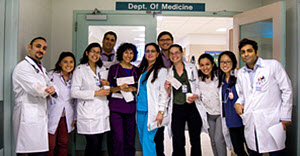 |
|
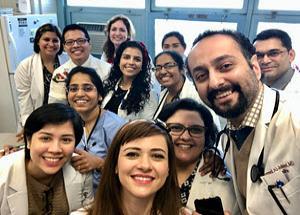 |
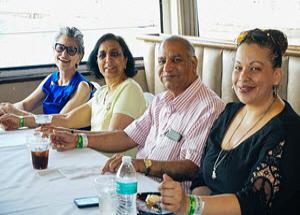 |
|
 |
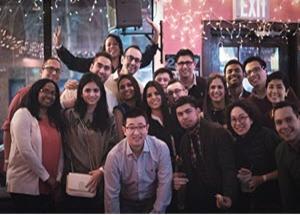 |